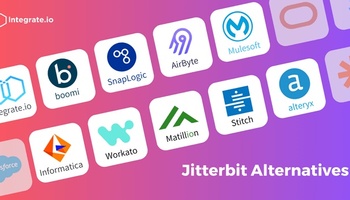In 2023, data analysts have access to more data than at any other time in history. Experts believe the amount of data generated in 2023 totaled 120 zettabytes, and humans will create around 463 exabytes every day by 2025.
That's an unimaginable volume of data!
All this data, however, is worthless unless you can process it, analyze it, and find insights hidden within it. Data pipelines help you do that. They enable the speedy flow of data from a source like a database or a spreadsheet to a final destination like a data warehouse. Think water moving through a tube.
The result? You can cleanse and transform data so it's ready for analytics.
Integrate your data with Integrate.io, the no-code data pipeline platform that empowers data-driven enterprises worldwide. Schedule a demo now. It requires no credit card!
Best Data Pipeline Tools
The best data pipeline tools require no code, so you can spend your time analyzing, not programming. However, with no clear definition for what constitutes a data pipeline platform, it's difficult to know where to start. Here are five tools based on price, features, and capabilities.
1. Integrate.io
Integrate.io is a cloud-based data pipeline tool that requires no code whatsoever. It primarily moves data from one source to another via the extract, transform, load (ETL) process. However, you can also transfer data to a final destination via extract, load, transform (ELT).
Integrate.io connects various data sources and destinations via no-code or low-code connectors so enterprises like yours can move business-critical information from different locations for analytics. These connectors include Amazon Redshift, Snowflake, Oracle, and over 100 others. There's also a Salesforce-to-Salesforce connector that you won't find with most data pipeline tools. (Find a list of Integrate.io data integrations here.)
Other benefits include:
- A simple pricing model that charges users based on the connectors used, not data volume consumed
- A powerful REST API connector
- Super-responsive customer service
- Simplified data pipeline processes that comply with GDPR, HIPAA, and other data governance frameworks
It's no wonder, then, Integrate.io has an average score of 4.3 stars out of five on the software review website G2.com, making it one of the most popular and best data pipeline tools out there.
What People Say About Integrate.io
- "I like that Integrate.io is user-friendly. You don't need to know code to connect systems. I also really appreciate the support. If we run into an issue, Integrate.io staff guides us to a solution. We get to build seamless integration across our systems." (An administrator in financial services.)
- "Anyone can use Integrate.io. Developers, analysts, business people. It's not overcrowded with functionality, and it does the things it does do well. Support is also helpful and available in real-time. I like the drag-and-drop functionality for creating new pipelines and how easy it is to schedule packages." (An administrator in publishing.)
- "There's not much to dislike. Integrate.io is pretty malleable, which allows us to use it for basically anything done with other apps." (A sales operations specialist.)
2. Fivetran
Unlike Integrate.io, Fivetran only moves data through pipelines via ELT. There's no option for ETL, which might limit businesses from searching for the best data pipeline tools. Still, features like world-class security, standardized schemas, and event data flow for unstructured data make this a pretty superb choice.
Like Integrate.io, users don't need to know code to build relatively complex data pipelines, so Fivetran suits enterprises lacking a data engineering team. However, the platform's pricing model isn't as simple, with users charged for the amount of data consumed.
Read more: Fivetran vs. Integrate.io
3. Stitch
The creators of Stitch designed this platform with developers in mind. There is an incredible range of features such as secure data transfers with no firewall infiltrations, integration with various data sources and destinations (though not as many as Integrate.io), and real-time evaluations of user experiences. The UI here is simple, making it an outstanding choice for smaller teams.
Like Fivetran, Stitch adopts a consumption-based pricing model, with prices starting from $100 per month for 5 million data rows. This method could work out more expensive for small teams that don't want to transfer lots of data but require a no-code/low-code tool.
Read more: Stitch vs. Integrate.io
4. Apache Spark
Apache Spark is an open-source data pipeline tool that won't cost you anything to use. Some of its best features include a thriving community on Stack Overflow, support for graphics processing, and the opportunity to create no-code pipelines for quick-and-easy data insights.
One of the best data pipeline tools for 2022, Spark suits smaller teams that want to transfer data from one place to another without complicated code. However, medium- and large-sized companies will require a more comprehensive paid-for solution to facilitate data analytics.
5. Talend Data Integration
Unlike the other tools on this list, Talend offers an open-source version of its paid-for platform called Data Integration, which transfers data through custom-built pipelines for free. Various integrations support this process, and the platform's streamlined UI remains popular in data engineering circles.
Data Integration has its limitations, however. Most data-driven companies of a certain size will need to upgrade to Talend's Data Management platform, which requires a fee, to generate worthwhile data analytics and unlock data monitoring and governance features.
Read more: Talend vs. Integrate.io
How Integrate.io Can Help
Although all the tools on this list prove valuable for pipeline-building, only Integrate.io offers ETL and ELT data transfers, Salesforce-to-Salesforce transfers, and a pricing model based on the number of connectors used. The platform also boasts the easiest-to-use workflow creation feature for defining dependencies between tasks, making it the most sensible choice for your organization.
With enhanced data governance compliance, top-tier customer service, and a powerful REST API, Integrate.io is your all-in-one platform for data pipeline solutions. Every day, organizations like yours are incorporating this tool into their tech stacks.
Are you looking for the best data pipeline tools on the market in 2024? Look no further than Integrate.io, which moves data from its source to a final destination like a warehouse for unparalleled business intelligence. Schedule a demo and learn more about this platform.
FAQs
Q: Which tool is used for data pipeline?
Several tools are used for data pipelines, including Integrate.io, Apache Kafka, AWS Glue, Hevo Data, and Fivetran. These tools help automate the process of moving data from various sources to destinations like data lakes or warehouses.
Q: Is data pipeline an ETL?
A data pipeline is not strictly an ETL process, though it can include ETL. Data pipelines are broader and can involve moving data without transformation, whereas ETL specifically involves extracting, transforming, and loading data.
Q: What are the 5 steps of data pipeline?
While the exact steps can vary, a common framework for building a data pipeline includes:
1. Define the Pipeline's Goal and Design the Architecture
2. Choose Data Sources and Ingestion Strategy
3. Design the Data Processing Plan (which may include ETL)
4. Set Up Storage and Orchestrate the Data Flow
5. Deploy and Monitor the Pipeline.
Q: Is SQL a data pipeline?
SQL itself is not a data pipeline tool. However, SQL can be used within data pipelines for querying and transforming data. Tools like SQL Server Integration Services (SSIS) are used for building ETL processes, which are part of data pipelines.
Q: What are ETL tools?
ETL tools are software applications designed to extract data from multiple sources, transform it into a consistent format, and load it into a target system, such as a data warehouse. Examples of ETL tools include Integrate.io, Informatica PowerCenter, IBM Infosphere Datastage, and Talend.











